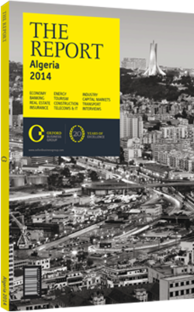Tapping into financial reserves to cover rising expenditure
Development of Algeria’s oil and gas resources has allowed it to amass considerable financial reserves, helping maintain high levels of domestic investment during periods of slack global growth and partially offsetting the country’s vulnerability to external price shocks. Indeed, Algeria’s public works and robust GDP growth make for a distinct contrast to the more moribund climates in nearby Europe.
Algeria’s abundant natural resources continue to play a key role in underpinning growth, and in 2013 hydrocarbons represented over 30% of GDP and 60% of budget receipts. However, this does leave it exposed to fluctuations in prices. Including the current and capital expenditures planned by the government, alongside existing obligations, the IMF estimates Algeria’s break-even oil price at around $120. Prices in late 2014 had, by comparison, dropped to below $60.
Risks
This does not pose much of a short-term risk for the country’s macro performance but could put fiscal buffers under significant pressure and highlight the importance of managing the balance sheet. The economy has undergone several shocks related to dropping oil prices: once in the late 1980s and again in 2008-09. The government responded to the latter with a 25% rise in expenditure in 2011, which has transferred into subsequent budgets.
Due to the higher spending, the lower oil prices have the potential to heighten the pressure on Algeria’s fiscal policies. Expenditure is currently outpacing its revenue. A reduced trade balance, combined with lower revenue from services and direct international transfers, pushed Algeria into a current account deficit of €1.69bn by June 2014, down from a surplus of €617m at year-end 2013 – its first current account deficit in nearly 15 years. Meanwhile, the government’s budget deficit is expected to reach AD3.44bn (€32m) in 2014, up more than 61.5% from AD2.2bn (€20.5m) in 2013, which will weigh heavily on financial reserves.
Earlier in 2014, the IMF said falling oil prices would likely contribute to the shortfall. “The fiscal deficit is expected to widen to over 6% due to lower hydrocarbon revenue, a sharp increase in capital expenditure, and continued high current spending. The oil savings fund remains large but is expected to decline for the second consecutive year,” the fund noted in its report.
2015 Budget
The exogenous pressures emphasise the importance of rationalising expenditures, although the government has proposed a significant uptick in both operational and investment spending in 2015 to meet its economic development goals. The budget, approved by the legislature in November 2014, plans total government expenditure of AD8.86trn (€82.4bn) in 2015, an increase of 15.7% year-on-year (y-o-y).
Operating expenditure is slated to rise a more modest 5.5% y-o-y to AD5trn (€46.5bn), driven largely by a 6.5% increase in spending for public sector salaries. The defence, interior and education ministries will continue to absorb the majority of operational expenditure in 2015 (51%), given their high demand for manpower. However, priority industries saw the biggest increases to their operating budgets y-o-y, including 19.3% for the Ministry of Industry and Restructuring, 9.4% for agriculture and 7.2% for energy.
Spending on social transfers, which includes financial support for low-income populations, public services and consumer goods subsidies, is also projected to rise by over 6% y-o-y to AD1.7trn (€15.8bn), which is equivalent to 9.1% of GDP. Of this, subsidies on energy products and food staples will account for 13.2% of total social transfers, or AD225.8bn (€2bn).
Dellicate Balance
Algeria expects its budget revenue to grow 11% y-o-y to AD4.7trn (€43.5bn) in 2015, as both oil and regular fiscal revenues grow. However, even if the government receives all of its expected revenues, this would cover just a little more than half of what the state plans to spend in 2015.
Government authorities have insisted that lower oil prices will not impact the country’s spending plans; nonetheless, the budget deficit is set to rise again to AD4.17trn (€38.8bn) in 2015, equivalent to 22% of GDP.
You have reached the limit of premium articles you can view for free.
Choose from the options below to purchase print or digital editions of our Reports. You can also purchase a website subscription giving you unlimited access to all of our Reports online for 12 months.
If you have already purchased this Report or have a website subscription, please login to continue.

